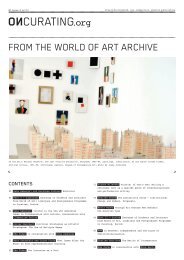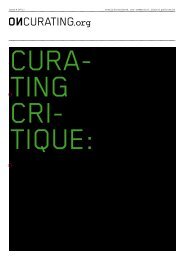You also want an ePaper? Increase the reach of your titles
YUMPU automatically turns print PDFs into web optimized ePapers that Google loves.
060 Issue # 11/11 : PublIc Issues<br />
What would be the impacts of large-scale projects on small-<br />
scale interventions? The former are driven by big capi-<br />
tal and hailed <strong>as</strong> so-called urban transformation. This is<br />
a crucial point. Will giant projects swallow up small<br />
interventions?<br />
Özge: Actually, what Oda Projesi can do at the moment is<br />
try to excavate such micro-situations <strong>as</strong> much <strong>as</strong> possible.<br />
Just <strong>as</strong> in the theory of throw-away cities, what we find<br />
here is the c<strong>as</strong>e of throwing away of a whole p<strong>as</strong>t – and<br />
micro-formations are parts of this w<strong>as</strong>ted p<strong>as</strong>t. But on the<br />
other hand, these survival structures are completely re-<br />
liant on the economy. As long <strong>as</strong> there is a need for survi-<br />
val, these micro-formations will be able to keep reproducing<br />
themselves. But everything changes along with the<br />
economy – from marketing campaigns of newly constructed<br />
gated communities, which are displayed flagrantly in public<br />
space, to discourses that are shaped to find solutions<br />
to the congestion problem in the transport sector. The<br />
latter should be taken seriously since, along with improving<br />
access to neighbourhoods in the city, there are<br />
incre<strong>as</strong>ing proposals for beautifying these neighbourhoods.<br />
The upper-middle cl<strong>as</strong>ses are tired of w<strong>as</strong>ting time in<br />
traffic; improving transport would accelerate innercity<br />
safaris; the accessible parts of the city are already<br />
being exposed to transformation. One example is Bilgi<br />
University, which located its campuses in decaying suburbs<br />
or slum are<strong>as</strong> of the city twenty years ago; another is the<br />
development of city marketing strategies along with the<br />
incre<strong>as</strong>ing interest in the city of Istanbul, aimed at ge-<br />
nerating capital from tourism – all these phenonema pro-<br />
ceed with mutual interaction. Yet I am inclined to see all<br />
of them <strong>as</strong> urban dynamics – carnage committed in the name<br />
of the European Capital of Culture, for example. That<br />
is, the negligence and destruction of spaces that are consi-<br />
dered to be a problem – we can well define some of these<br />
things <strong>as</strong> spatial genocide. The shift is undertaken at a<br />
terrifying speed, along with mottos like "we have to destroy<br />
all gecekondu buildings until the year 2010 and we must<br />
renovate all buildings that are of historical importance". 7<br />
Such problems have been overlooked so far since the macro-<br />
economy w<strong>as</strong> b<strong>as</strong>ed largely on micro-economies. But what<br />
they are trying to do now is to destroy all of these at a<br />
miraculously swift speed. They see the residents of neigh-<br />
borhoods under urban transformation simply <strong>as</strong> a m<strong>as</strong>s –<br />
where<strong>as</strong> all these residents have particular needs, different<br />
desires, and different lifestyles.<br />
Empathy<br />
Günes¸: Oda Projesi does not aim to strike roots at the<br />
sites it visits. Instead, it adopts a curious and sometimes<br />
even skeptical approach. But the issue of empathy intrigues<br />
me. What we do entails being a spectator and a guest,<br />
listening and opening things up to discussion. If empathy<br />
is about placing oneself in someone else's position,<br />
Oda Projesi's attitude involves prompting others to <strong>as</strong>k<br />
themselves questions rather than empathizing with them.<br />
This might sound fine at first glance but I think such<br />
an approach h<strong>as</strong> its own problems.<br />
Özge: I don't think that we have a negative approach to<br />
the concept of empathy. I even think that it h<strong>as</strong> been<br />
one of the b<strong>as</strong>ic dynamics of Oda Projesi. The first three<br />
years in the neighbourhood, which were not marked by art<br />
projects, attests to this fact. One question h<strong>as</strong> remained<br />
significant throughout: "How can I establish together-<br />
ness with someone who is different?" The neighbourhood had<br />
also this dimension. Empathy is a precondition for establishing<br />
this togetherness.<br />
I have never lived in a<br />
flat that consisted only of<br />
a single room but I saw it<br />
there, existing in the life<br />
of my neighbour. I experienced<br />
it spatially when I<br />
visited its residents; I be-<br />
came a guest in a flat that<br />
w<strong>as</strong> b<strong>as</strong>ically a single room.<br />
This is quite different from<br />
seeing similar things on<br />
the TV screen. If I were not<br />
present in that space, I<br />
would not believe that such<br />
living conditions existed.<br />
That single room and our<br />
room established a natural<br />
affinity.<br />
Just next to a space that<br />
w<strong>as</strong> overloaded and saturated<br />
with functionality, our<br />
definition of a space of no<br />
use gained a different mea-<br />
ning. How could these two<br />
opposites live next to each<br />
other without appealing to<br />
the sense of empathy? I am<br />
talking about a mutual empa-<br />
thy, for sure. Without it<br />
how can I relate to anyone<br />
other than myself? If a<br />
relationship emerges in the<br />
absence of empathy, it would<br />
be absolutely superficial.<br />
Empathy is something that re-<br />
lates to what h<strong>as</strong> been expe-<br />
rienced. Another example of<br />
this w<strong>as</strong> the Marmara Earthquake<br />
in 1999. If we hadn't<br />
experienced that trauma<br />
ourselves, not many people<br />
would have rushed to support<br />
those badly affected by<br />
the earthquake. We encounter<br />
news of dis<strong>as</strong>ters only<br />
through the coldness of the<br />
media; and since television<br />
tends to blend tragic things<br />
with entertainment, images<br />
of trauma seem to us not<br />
sufficiently credible. Expe-<br />
riencing a situation by<br />
inhabiting a place induces<br />
empathy.<br />
Representation<br />
Derya: H<strong>as</strong> Oda Projesi be-<br />
come a trademark? This<br />
branding does not necessarily<br />
involve being an art<br />
collective representing<br />
Turkey. Perhaps it represents<br />
collaborative art practices?<br />
I don't necessarily mean a<br />
negative implication in <strong>as</strong>k-<br />
ing this and I'm not saying<br />
that Oda Projesi is confined<br />
to this. I would just say that<br />
7<br />
When this text<br />
w<strong>as</strong> undergoing<br />
revision in<br />
March–April 2011,<br />
the events of<br />
Istanbul 2010<br />
European Capital<br />
of Culture had<br />
already been fina-<br />
lized. It would<br />
be meaningful to<br />
evaluate the EcoC<br />
and rethink our<br />
discussion here<br />
in the light of<br />
this evaluation,<br />
but we shall<br />
leave this for a<br />
later occ<strong>as</strong>ion.


![Download as PDF [10.6 MB]](https://img.yumpu.com/4266533/60/500x640/download-as-pdf-106-mb.jpg)

